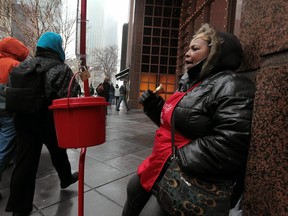Bell Ringer: What Four Categories Makeup Gdp?
William Watson: Bell-ringing is not enough

When Salvation Regular army bong-ringers look and ask, donations soar, new study finds
We humans are a strange species, aren't we? And nosotros economists, I'm afraid to say, are often among the strangest humans. With perfect seasonal pitch, the National Bureau of Economical Research has just published a paper in which three economists report the results of an experiment involving, of all things, Salvation Army bong-ringers. The economists — one from the University of California at San Diego, one from Yahoo! Research Labs and the third from Washington-based Innovations for Poverty Action — wanted to observe out how people respond to direct requests for charitable donations.
Then they set up an experiment outside a Boston grocery store and over four days in December 2009 watched to encounter how people entering and exiting the store interacted with Conservancy Army volunteers. In gild to make the experiment more than interesting and statistically powerful, they varied the charitable approach. For some 23-minute periods — they don't explain why they chose 23 — they posted a bell-ringer at only one of the store's two front doors. For others, they had both front doors covered, only non an out-of-the-way side door. And sometimes they had the bell-ringers avoid eye contact and confine themselves to ringing, while other times they had them seek eye contact and make the following verbal solicitation: "Hi, how are you? Merry Christmas. Please give today." In the merchandise, this plain is known every bit a "deep-layer social interaction."In total, the economists observed more than 17,000 entrances and exits from the store. What were the results?
Judging past which doors they used going in and out, more a quarter of people went out of their way to avoid confronting a bell-ringer. Whether this was to avoid the guilt and/or shame of not giving, to control an overwhelming altruistic impulse to accident the family upkeep on a donation, to limited disapproval of the religiously motivated Conservancy Army or simply because of aversion to bells is hard to say. On the other, hand, in those situations where a bell-ringer was pretty much unavoidable, donations did not rise significantly, then information technology'southward probably not a case of impulsive givers avoiding the temptation to give beyond reason.
Being economists, the economists were able to summate the cost of people going out of their way to avoid interaction with the Salvation Regular army. The average American (did yous know?) walks at iv.iv feet per second. Changing doors involved a 70-foot detour. The average wage in that surface area of Boston is US$18, so the xvi seconds the detour took involved an average fourth dimension cost of about a dime, non counting aversion to walking. This compared with an average donation by those who did give of US$one.69.
How did the unlike modes of collection practice? Baseline donations, those when a non-speaking, non-eye-contact-making bell-ringer covered just ane door, were but under US$twenty/hour. Covering the second door the same way brought in essentially the same corporeality and didn't reduce donations at door No. one. (Handy lesson for the Salvation Army: "Placing ii bell-ringers at the very same store appears to be only as good as distributing them to unlike supermarkets.")
But the study'south biggest lesson is that deep-layer social interaction rocks. Hourly donations were nigh sixty% higher when bell-ringers fabricated eye contact and asked for donations. Strangely, though, "Asking is both aversive and effective." More than people went out of their style to avoid being asked (mainly when leaving the store, presumably, having been asked on the way in), but donations amidst those who did give were higher. The economists' data don't allow them to test just why it is that asking has such a powerful consequence. The bong was ringing and the Salvation Army volunteer nowadays in the non-ask experiments, so the social pressure level was still as swell, as was the opportunity to signal ane'south moral superiority, if that's what much giving is about, by making a donation. But in addition to those conditions, the very uncomplicated ask fabricated a large difference.
The three economists — two wise men and a wise woman — attribute information technology to something economic models typically don't embody: empathy. Equally they put it, "stimulating one's empathy through a direct and vocal ask can create a temptation to be generous that is hard for humans to resist" and they advise that hereafter research "focus on the act of request itself as the linchpin to understanding both the costs and benefits of the giving interaction."
Be that as it may, one lesson we should all draw from this study is that when at this time of twelvemonth the Salvation Army or other such organizations request a deep-layer social interaction, we humans should go with our empathy and not resist the temptation to requite generously.
Source: https://financialpost.com/opinion/william-watson-bell-ringing-is-not-enough
Posted by: gillenwatersquill.blogspot.com


0 Response to "Bell Ringer: What Four Categories Makeup Gdp?"
Post a Comment